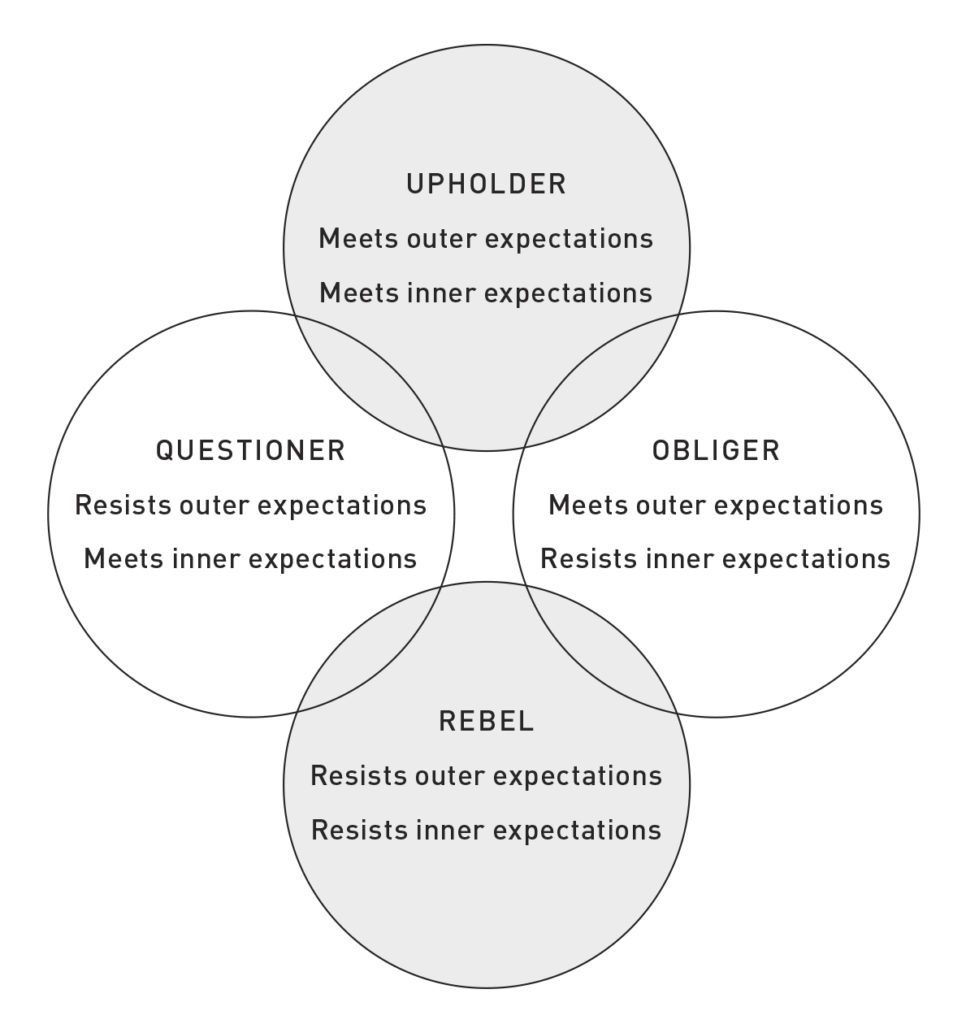You’d go to the ends of the Earth to avoid letting someone else down, so why do you struggle with goals you set for yourself? It comes down to how you’re wired, if you’re among the 41% of the population that falls into the obliger tendency.
Fortunately for obligers, there are some simple ways to play up your unique strengths and increase accountability, making you much more likely to hit your health and fitness goals. This post will talk all about staying on track when you’re an obliger.
What’s the Obliger Tendency?
If you missed our post yesterday, an obliger is one of four personality types profiled by author Gretchen Rubin in her book, The Four Tendencies. These personality types (“tendencies”) are based on how we respond to inner and outer expectations.
An obliger is someone who responds well to outer expectations like deadlines but who struggles with inner expectations like personal to-do lists. In other words, “If I have to, I will: If I want to, I won’t” (Rubin).
How does that look in health and fitness world? Let’s use weight loss as an example. An obliger whose doctor tells her to lose weight has decent odds of success. If that same obliger decides to lose weight on her own, she’s much more likely to struggle.
Not quite sure if you’re an obliger? Stop right now and take this easy 3-minute quiz, which will tell you if you’re an obliger or one of Rubin’s other three tendencies:
- Upholders, who do pretty well at meeting both inner and outer expectations.
- Questioners, who are more likely to meet inner expectations than outer expectations.
- Rebels, who resist both inner and outer expectations.

Change can be difficult when it comes to health and fitness, and a lot of the challenge comes from staying consistent with your efforts when life gets crazy. In my personal and professional experience, Rubin’s framework provides some great insights for doing just that based on distinct personality traits (in this case, how you respond to expectations!).
So how can you do that when you struggle with expectations you set for yourself? Stay with me, because I’ve got a few tricks up my sleeve. But first, let’s discuss a couple of variations on the obliger tendency.
Variations on the Obliger Tendency
All obligers do better with outer expectations than inner expectations. However, there are two variations on the obliger tendency that are worth mentioning.
Obliger-Upholders have a stronger instinct for self-preservation than other types of obligers. Because of this, they can more easily say no to outer expectations that are unrrealistic, even when they feel guilty about it.
Obliger-Rebels, on the other hand, are prone to resentment when they feel like other people are imposing expectations on them (particularly when someone asks a lot of them). They’ll still meet outer expectations to a point. However, overburdened obliger-rebels are prone to a phenomenon called obliger rebellion, which causes them to revolt against expectations altogether.
Do either of these variations on the obliger tendency ring true for you? Be sure to check out our posts on rebels and upholders for more insights.
With that in mind, there are a few motivational strategies that can be very effective for most obligers. Let’s look at those now.
The Key to Success for the Obliger Tendency
As an upholder who leans toward obliger, I know how much of a bummer it can be to miss out on an expectation you set for yourself. However, there’s a serious upside to obligerism, and we’re going to harness those powers to help you reach your goals.
How to Stay on Track if You’re an Obliger
As we’ve discussed, obligers do a great job with external accountability. If you’re an obliger with health and fitness goals, you absolutely must create external accountability if you want to succeed in reaching your goals.
Let’s talk about a few ways to do that.
Don’t Dupe Yourself
Are you an obliger who often thinks that you’d be able to achieve the goals you set for yourself…if only other people stopped asking so much of you?
Friend, I’m sorry, but you’re fooling yourself. If you’re waiting for your schedule to ease up so that motivation will strike, you’ll be waiting a long time. Obligers simply aren’t wired for self-accountability.
(Need more evidence? Consider upholders, who will prioritize their inner expectations at times even when they’re buried in outer expectations).
That’s absolutely not to say that you’re a slacker, because obligers are very hard workers. It just reinforces the argument that obligers need some outside factor—such as a coach, a workout buddy, or a deadline—to stay on track.
Get Creative with Your Inner Expectations
If you’re struggling with getting into the gym as much as you’d like, it might help to think about how your workouts benefit people you care about.
Are you a nicer parent or a more productive employee when you make it to the gym? Super! Now, reframe your gym visits as something you do for your kids, your boss, or your clients.
See what we’re doing here? In a way, we’re turning an inner expectation into an outer expectation, and one that you’re more likely to meet.
Hire a Coach
I’m not sure if this is an official definition, but I think of coaches as professional accountability butlers. A good coach will get to the bottom of why you’re struggling to meet your goals and devise strategies to keep you on track.
For many obligers, just the act of checking in with a coach provides enough oversight to make progress on goals that they never thought were possible. The trick is to find the right kind of coach.
The first consideration is one-on-one coaching versus group coaching. Group fitness and nutrition coaching may provide a bit of an edge for social obligers because there are actually TWO sources of external accountability: your coach and your peers.
One-on-one coaching, on the other hand, is awesome for people who need a little extra help. For this reason, I’ve been encouraging personal training for some of my obligers who come out of our on-ramp (CrossFit 101, if you’re not familiar). I don’t want them to go missing after our scheduled one-on-one appointments!
The second consideration is your accountability sweet spot. Obliger-rebels or more introverted obligers are more susceptible to obliger rebellion with an overzealous coach. These obligers might benefit from online coaching with just a couple of email check-ins per week.
Find an Accountability Partner
Is professional coaching a little steep for your budget? Try an accountability partner or workout buddy! It’s difficult for an obliger to bail on a workout when he knows his buddy is waiting for him at the gym.
Similarly, I’ve recommended that two obliger clients (who were good friends) prep each other’s meals. Each of these clients struggled with making their own meals but had no problem doing it for her friend.
Shout Your Big Hairy Fitness Goals from the Rooftops
As an upholder-obliger, I do better at following through with my commitments to myself when I have people nagging me cheering me on.
A few weeks ago, I decided to row 100,000 kilometers in 4 weeks…even though I have one leg in a cast. The second thing I did (after first questioning my life choices) was to call my shot on social media. Then I told everyone I know.
Were my progress posts super annoying to my friends and family? Totally. But I think of it like this: They love me and want me to be happy and successful. They have to hear all about it so I don’t let myself down. The ones who know me best even ask me about my big goals because they know it’s helpful to me.
Watch Out for Obliger Rebellion
External accountability is absolutely necessary for obligers to succeed, but you have to know your limits.
A pushy coach, a nagging partner, or even an inner expectation turned outer expectation (for example, “my partner expects me to RX this workout,” when the partner may have no such expectation) can be all it takes for an obliger to throw in the towel. And sadly, obliger rebellion can manifest as self-destructive behaviors when it comes to health and fitness.
For this reason, it’s important for obligers to speak up as soon as they start to feel resentful, overburdened, or overwhelmed. It can be uncomfortable for obligers to set boundaries, but it will save a lot of grief in the long run.
Whew—that’s a lot. If you take home one key point from this post, remember this: Obligers need outer accountability.
Need a little more info? I’ll be talking about this in more detail during my FREE virtual Resolution Remix Lunch and Learn on December 29th at noon. Grab your spot right here!

